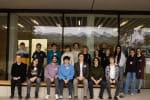It’s almost the new year, which means it’s time for the 2026 IceCube Calendar! Featuring breathtaking photos taken by our winterovers from the past few years, this calendar will teach you something new about the IceCube Neutrino Observatory and the South Pole every month. The calendar is available to download in three different sizes in either […]
Outreach
“Messengers,” documentary film featuring IceCube, screening this fall
“Messengers,” an immersive documentary featuring IceCube, is now playing internationally across a series of film festivals this fall. The new film by Canadian director Jeffrey Zablotny features the South Pole neutrino experiment as part of a surreal, poetic exploration of three groundbreaking particle physics experiments across the world. From a sealed laboratory carved into a […]
Exploring the universe through a new astrophysics video game
“Project Hercules” is the latest educational video game from Field Day, an award-winning game design studio based at the Wisconsin Center for Education Research within the School of Education at the University of Wisconsin–Madison. Developed in collaboration with the Wisconsin IceCube Particle Astrophysics Center (WIPAC), the Wisconsin Department of Public Instruction, and a network of […]
Twelfth edition of IceCube Masterclass brings together students and scientists
Over 200 students across 18 institutions in Belgium, Canada, Germany, India, and the United States participated in the twelfth annual edition of IceCube Masterclass. The masterclasses were held between the months of March and May, with the Institute of Physics (IOP) in India and the University of Nevada, Las Vegas, hosting masterclasses for the first […]
IceCube’s hidden depths revealed in theatrical festival documentary “Messengers”
The IceCube Neutrino Observatory, a massive astroparticle physics experiment located at the South Pole, is the subject of the final chapter in a new documentary, “Messengers,” from Canadian director Jeffrey Zablotny. The film is a poetic, immersive exploration of three neutrino detectors: SNO+ in Canada, Super-Kamiokande in Japan, and IceCube at the South Pole. The […]
Download IceCube’s 2025 calendar!
It’s almost the new year, which means it’s time for the 2025 IceCube Calendar! Featuring breathtaking photos taken by our winterovers from the past few years, this calendar will teach you something new about the IceCube Neutrino Observatory and the South Pole every month. The calendar is available to download in three different sizes in either […]
WIPAC agreement with Thai partners signals enthusiasm for future collaborations
This story was originally published by the University of Wisconsin–Madison International Division. Among the University of Wisconsin–Madison’s many ambitious research endeavors, the IceCube Neutrino Observatory stands out as one of the most unique. This remarkable telescope, which has instrumented a billion tons of South Pole ice, is designed to search for tiny, ghostlike particles called neutrinos, helping […]
Help IceCube (again!) decode signals from outer space
Last year, the “Name that Neutrino” project was launched, which called on volunteers from the public to help classify signals from neutrinos—tiny, ghostlike particles from outer space—for the IceCube Neutrino Observatory at the South Pole. The project was hosted on Zooniverse, the largest web-based research platform that invites novices and science enthusiasts alike to contribute […]
Jim Madsen retires after 25 years with neutrinos
Jim Madsen, interim director of the Wisconsin IceCube Particle Astrophysics Center (WIPAC) at the University of Wisconsin–Madison and associate director for education and outreach for the IceCube Neutrino Observatory, recently announced that he was retiring after 25 years with IceCube and its predecessor AMANDA. His last day in the office was August 2. “With a […]
IceCube Masterclass brings together students and scientists from around the world
This year, over 200 students across 20 research institutions in Belgium, Canada, Denmark, Germany, Thailand, Sweden, and the United States participated in the eleventh edition of IceCube Masterclass. The masterclasses were held between the months of January and May, with many of them running an in-person program. This year, the University of Utah and Chiang […]









